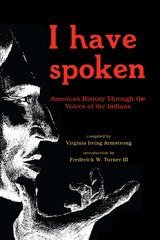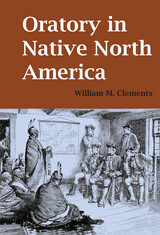
I Have Spoken is a collection of American Indian oratory from the 17th to the 20th century, concentrating on speeches focusing around Indian-white relationships, especially treaty-making negotiations. A few letters and other writings are also included.
Here, in their own words, is the Indian’s story told with integrity, with drama, with caustic wit, with statesmanship, with poetic impact; a story of proffered friendship, of broken promises, of hope, of disillusionment, of pride, of a whole land and life gone sour.

Here is a rich documentation of oratory dating from the earliest records: Benjamin Franklin's publication of treaty proceedings with the Six Nations of the Iroquois; the travel narratives of John Lawson, who visited Carolina Indians in the early 1700s; accounts of Jesuit missionary Pierre De Smet, who evangelized to Northern Plains Indians in the nineteenth century; and much more. The book also includes full texts of several orations. These texts are comprehensive documents that report not only the contents of the speeches but the entirety of the delivery: the textures, situations, and contexts that constitute oratorical events. While there are valid concerns about the reliability of early recorded oratory given the prejudices of those recording them, Clements points out that we must learn what we can from that record.
He extends the thread unwoven in his earlier study Native American Verbal Art to show that the long history of textualization of American Indian oral performance offers much that can reward the reader willing to scrutinize the entirety of the texts. By focusing on this one genre of verbal art, he shows us ways in which the sources are—and are not—valuable and what we must do to ascertain their value. Oratory in Native North America is a panoramic work that introduces readers to a vast history of Native speech while recognizing the limitations in premodern reporting. By guiding us through this labyrinth, Clements shows that with understanding we can gain significant insight not only into Native American culture but also into a rich storehouse of language and performance art.

Carlson argues that by drawing on the conventions of early colonial treaty-making, nineteenth- and early twentieth-century Indian autobiographers sought to adapt and redefine the terms of Indian law as a way to assert specific property-based and civil rights. Focusing primarily on the autobiographical careers of two major writers (William Apess and Charles Eastman), Sovereign Selves traces the way that their sustained engagement with colonial legal institutions gradually enabled them to produce a new rhetoric of "Indianness."
READERS
Browse our collection.
PUBLISHERS
See BiblioVault's publisher services.
STUDENT SERVICES
Files for college accessibility offices.
UChicago Accessibility Resources
home | accessibility | search | about | contact us
BiblioVault ® 2001 - 2024
The University of Chicago Press









